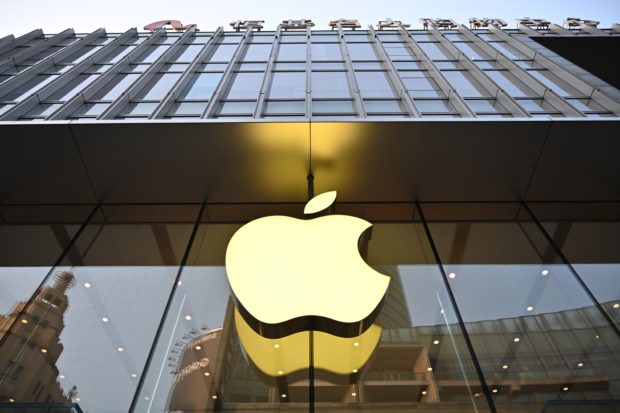Will Apple’s roots in China hold fast amid political storm?

In this file photo taken on May 10, 2019 an Apple logo is displayed at store in Shanghai. – Apple is seen as a prime target for retaliation over US moves against the Chinese tech giant Huawei, but the roots planted by the company in China should help it weather the storm, analysts say. AFP FILE PHOTO
SAN FRANCISCO — Apple is seen as a prime target for retaliation over US moves against the Chinese tech giant Huawei, but the roots planted by the company in China should help it weather the storm, analysts say.
While Beijing may take aim at Apple in the countries’ high-stakes trade war, experts believe that the company’s size, cachet, and years spent cultivating business relationships in China should protect it from any direct retaliation.
“As the US pounds on Huawei, Apple is the likely target for China to pound back,” technology analyst Rob Enderle of Enderle Group said.
“As the trade war accelerates, then Apple and Huawei are the two firms likely to get the damage,” he said.
Huawei has been thrust to the center of escalating tensions between the world’s two top economies, which have exchanged tariffs on hundreds of billions of dollars in two-way trade.
President Donald Trump’s administration has infuriated Beijing by blacklisting the smartphone and telecommunications company over worries that China uses it as a tool for espionage and allegations of breaking Iran-related sanctions — charges the company has denied.
Trump has said that Huawei’s fate could be included in any deal to resolve their trade war, but such a deal has proved elusive, and in the interim, tensions remain high.
The company is considered a “national treasure” in China, and Apple has similar status in the US, said Enderle.
“It is always difficult dealing with companies considered national treasures,” he said.
“There is certainly a risk of this escalating beyond reason.”
Points in Apple’s favor
But Apple has various factors in its favor.
Increasing costs or crimping production for Apple directly in China could cause self-inflicted wounds, since much of the company’s manufacturing is done there and jobs could be lost, analysts say.
Playing into nationalist sentiment that shunning Apple is a sign of Chinese loyalty is something the government “could get away with,” Enderle said.
RELATED TOPICS iphone Sales Are Falling, and Apple’s App Fees Might Be Next Apple Looking to Push Other Services to Offset iPhone Slumps Apple Mixing Things Up: First iPod Model in Four YearsBut boycotts of Apple products that began in China last year due to the US’s treatment of Huawei had no meaningful impact on the American company, according to Creative Strategies analyst Carolina Milanesi.
And in a Bloomberg interview on Monday, the chief executive of Huawei said he was against the idea of calling for a boycott of Apple products in China.
“At the end of the day, there is a lot that Apple is doing in China from an economy perspective that helps China,” Milanesi said.
“I struggle to see China using Apple as a way to retaliate against the US.”
On its website, Apple says it has created five million jobs in China, three million of which were related to contractors and investment.
A million of those jobs were its staff, and about 1.8 million were through the App Store ecosystem for developers who make digital content or services for its mobile devices, the company said.
Targeting Trump’s base?
And while hampering Apple product production in China would hurt that country’s economy, forcing up the price of iPhones exported to the US would not be much of a political blow against the Trump administration, according to Forrester analyst Frank Gillett.
“The Chinese government is more likely to target the Trump base,” Gillet said.
“Hitting a California-based company doesn’t seem to give them a lot of leverage, it makes more sense to go after agriculture and everyday stuff.”
Analysts also noted that Apple chief Tim Cook ran supply chain logistics for the company before succeeding the late co-founder Steve Jobs at the helm in 2011.
“Tim Cook knows the culture in China and has worked very closely understanding how to tread carefully to make more of an impact there,” Milanesi said.
Cook’s supply chain expertise also makes him an ideal executive to figure out ways to move manufacturing out of China if the need arises.
Apple’s rise to one of the world’s most valuable companies has involved cultivating strong relationships with Asian suppliers and manufacturers such as Taiwan-based Foxconn Technology Group and Pegatron.
“Everybody and their brother is trying to find ways to ship manufacturing out of China,” Enderle said.
“Tim Cook was a logistics guy, so if anyone can do this well it should be him.”